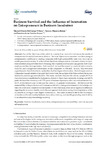Business Survival and the Influence of Innovation on Entrepreneurs in Business Incubators

View/
Use this link to cite
http://hdl.handle.net/2183/26202
Except where otherwise noted, this item's license is described as Atribución-NoComercial-SinDerivadas 4.0 España
Collections
- Investigación (FEE) [923]
Metadata
Show full item recordTitle
Business Survival and the Influence of Innovation on Entrepreneurs in Business IncubatorsAuthor(s)
Date
2020Citation
Campo Villares, M.O. del, Miguéns-Refojo, V. y Ferreiro-Seoane, F.J. (2020). Business Survival and the Influence of Innovation on Entrepreneurs in Business Incubators. Sustainability, 12 (15), pp 1-17. https://doi.org/10.3390/su12156197
Abstract
[Abstract]: One of the objectives of this article is to study how innovation influences the results of
entrepreneurs located in business incubators. The other objective is to examine how the training of
entrepreneurs contributes to creating companies with high sustainability rates over time that are
wealth generators in society. To achieve these objectives, entrepreneurs in business incubators in Spain
were identified along with their level of training, their experience in business management, how much
employment they have generated, their survival rate and the annual accounts (where economic,
financial, and management information on the companies is collected). In turn, they were sent
a questionnaire that allowed us to classify them by their degree of innovation. The techniques used are
independent sample statistics that apply the Levene’s test, the analysis of the balance sheet, the income
statements, and management indicators. This study concludes that, from the selected sample, 83.3% of
the entrepreneurs established in business incubators in Spain have university training, and 64.2%
prefer the branches of science, with 7.75 years of business experience, which favors business survival
(100% in the seventh year of life) and the creation of qualified employment. All this favors the
sustainability of the productive and business model which, being more intensive in knowledge and
R&D, becomes more competitive in the market. On the other hand, there are no significant differences
regarding the economic results, nor in the management indicators among the entrepreneurs of the
incubators according to their degree of innovation. The value of research lies in the importance
of studies on the relationship between innovation, training, and wealth-generating sustainability
in incubators in today’s knowledge economy.
Keywords
Business incubators
Innovation
Entrepreneurship
Sustainability
Survival analysis
Self-employment
Innovation
Entrepreneurship
Sustainability
Survival analysis
Self-employment
Editor version
Rights
Atribución-NoComercial-SinDerivadas 4.0 España
ISSN
2071-1050






